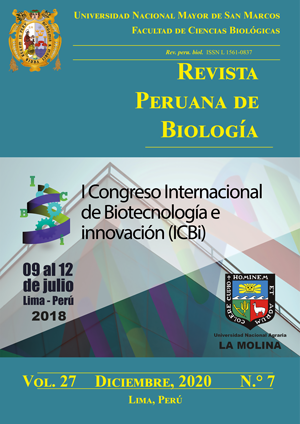Bacteria-Plant interactions: an added value of microbial inoculation
DOI:
https://doi.org/10.15381/rpb.v27i1.17575Keywords:
PGPB, biofertilizers, sustainable agriculture, interactions, active principles of plantsAbstract
High world population and the increase in global food demands results in an indiscriminate use of chemical fertilizers by farmers, causing soil deterioration and other environmental problems. In recent years there has been a collective concern to preserve the environment through sustainable and environmentally friendly techniques. Plant growth-promoting bacteria (PGPB) are widely known to benefit plants in a sustainable manner, reducing chemical fertilizers application. Many studies have shown that these bacteria not only improve crop yields but also its quality, increasing certain nutrients and molecules that are important for human health such as aminoacids, proteins, vitamins, flavonoids, antioxidants, essential oils, among others. This work compiles recent information of PGPB as an alternative of chemical fertilizer for improving crop yields and plant metabolites production.
Downloads
Downloads
Published
Issue
Section
License
Copyright (c) 2020 Katty Ogata-Gutiérrez, Doris Zúñiga-Dávila

This work is licensed under a Creative Commons Attribution-NonCommercial-ShareAlike 4.0 International License.
AUTHORS RETAIN THEIR RIGHTS:
a. Authors retain their trade mark rights and patent, and also on any process or procedure described in the article.
b. Authors retain their right to share, copy, distribute, perform and publicly communicate their article (eg, to place their article in an institutional repository or publish it in a book), with an acknowledgment of its initial publication in the Revista Peruana de Biologia.
c. Authors retain theirs right to make a subsequent publication of their work, to use the article or any part thereof (eg a compilation of his papers, lecture notes, thesis, or a book), always indicating its initial publication in the Revista Peruana de Biologia (the originator of the work, journal, volume, number and date).






